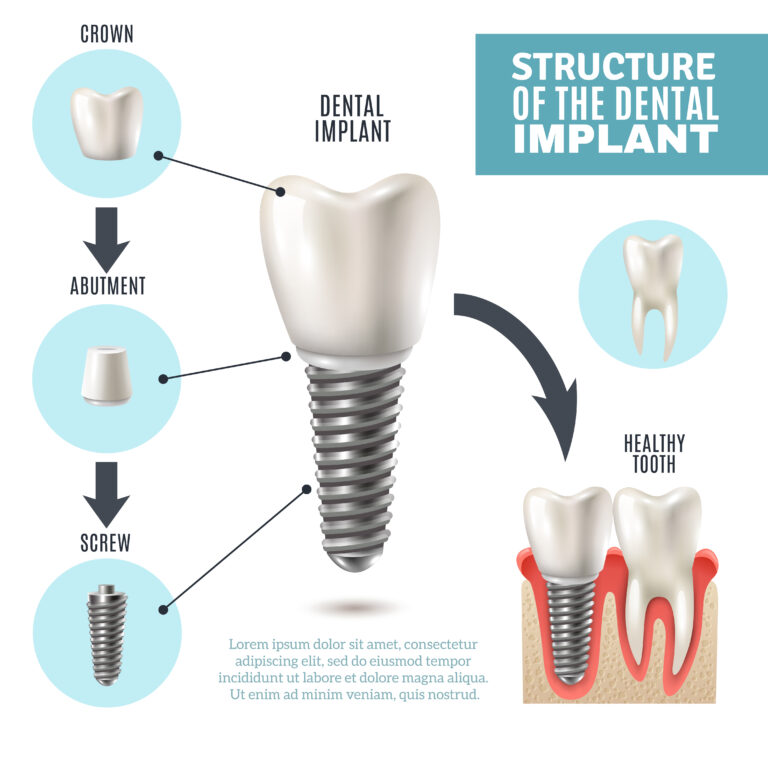Dental Implant
Dental implant surgery is a procedure designed to replace tooth roots with metal posts, providing a sturdy foundation for artificial teeth that closely resemble real ones in both appearance and function.
This surgical intervention serves as an effective alternative to ill-fitting dentures or bridgework, particularly in cases where the lack of natural tooth roots prevents the use of conventional tooth replacements.
The specific approach to dental implant surgery depends on the implant type and the condition of the patient’s jawbone, often involving multiple procedures.
The primary advantage of implants lies in their ability to provide robust support for new teeth, but this process necessitates a period of bone healing, extending the overall treatment duration to several months.

Symptoms
Dental implants are meticulously placed into your jawbone to function as sturdy anchors for replacing missing teeth. Due to the fusion of titanium with the jawbone, implants offer a secure solution, preventing issues like slipping, noise, or bone damage often associated with fixed bridgework or dentures. Additionally, dental implants are impervious to decay, unlike natural teeth that support traditional bridgework.
In general, dental implants may be a suitable option for you if you:
- Have one or more missing teeth.
- Possess a fully developed jawbone.
- Demonstrate sufficient bone support for the implants or are eligible for a bone graft procedure.
- Maintain healthy oral tissues.
- Prefer not to wear dentures.
- Do not have medical conditions that could hinder bone healing.
When to access Medical Care
If you observe any symptoms, seek medical attention promptly.
Determinants of risk
Similar to any surgical procedure, dental implant surgery carries some health risks. However, these issues are infrequent and often minor, with straightforward treatments available. The potential risks encompass:
- Infection at the implant site.
- Injury or harm to nearby structures, including neighboring teeth or blood vessels.
- Nerve damage, leads to sensations like pain, numbness, or tingling in your natural teeth, gums, lips, or chin.
- Sinus issues, particularly if dental implants in the upper jaw encroach into the sinus cavities.
Recovery process
Recovery duration varies, contingent on factors like patient characteristics, chosen procedure, and the extent of severity.
Why entrust your care to us?
At Steps 2 Cure, our foundation of trust is built upon several key pillars that ensure your confidence in our services and expertise. Our team comprises highly qualified professionals with extensive experience in their respective fields. Their knowledge and skills enable us to offer you the best possible care and solutions for your medical needs. We understand that each individual is unique, and so are their healthcare requirements.
That’s why we prioritize tailoring our treatments and approaches to your specific circumstances, ensuring that you receive care that is truly designed for you. You are at the heart of everything we do. Your comfort, concerns, and aspirations guide our efforts. Our compassionate approach ensures that you feel valued and supported throughout your healthcare experience.
To commence the treatment procedure, you can start by forwarding your questions via WhatsApp at (+91 99xxxxxxxxx) or by sending an email to care@steps2cure.com. Our team will ensure a swift response to your queries.
Dental Crown
Still have a Query?
Your health and peace of mind matter to us, and we’re dedicated to addressing any inquiries you may have with care and expertise. Feel free to reach out.
Subsribe To Our Newsletter
Stay in touch with us to get latest news and special offers.

